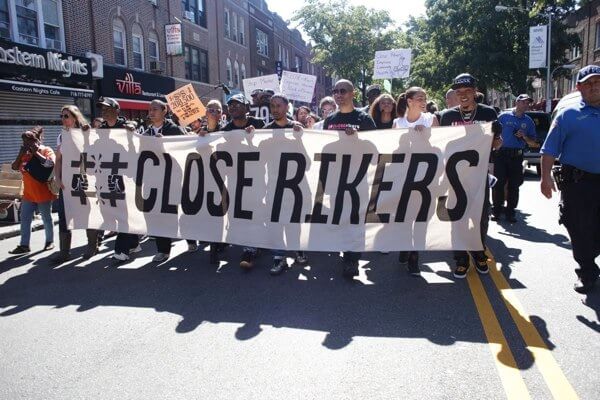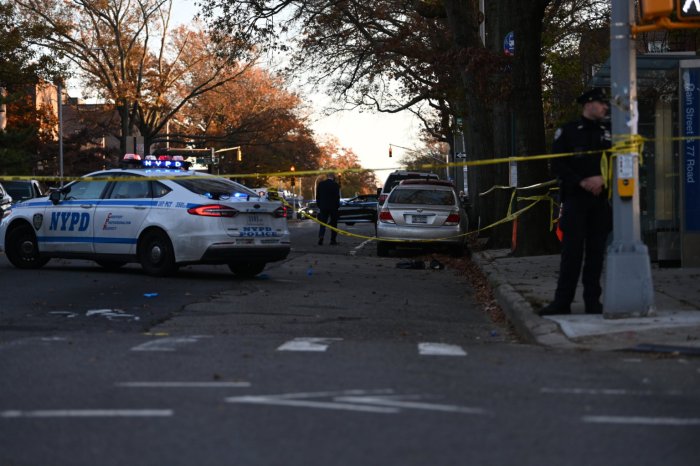By Bill Parry
Nearly 1,000 protesters demanded the closing of Rikers Island during a march through Astoria on their way to a rally at the base of the bridge to the notorious prison complex. Glenn E. Martin, founder and president of JustLeadershipUSA, which organized the event that drew celebrity speakers such as Russell Simmons and John Legend and a host of former prisoners, advocates and elected officials, marvelled at the turnout.
“It was everything I imagined and more,” Martin said. “On Saturday evening our hashtag #CLOSErikers trended No. 3 on Twitter around the world. Our message is clear. Closing Rikers is not just a local issue, we find it representative of the jail problem in America.”
JustLeadershipUSA’s mission is to cut the U.S. prison population in half by 2030. Martin was VP of the Fortune Society, the Long Island City-based non-profit that helps former prisoners re-enter society, before starting the organization in 2014.
“I was sent to Rikers on a shoplifting charge when I was just 16 and within two days I was stabbed in a fight,” Martin said. “Mayor de Blasio often lists the reforms his administration has introduced to improve some of the most egregious conditions on Rikers Island. While his efforts are noble, to us it is like lipstick on a pig.”
Martin is part of a high-profile commission chaired by former New York State Chief Judge Jonathan Lippman that is studying the logistics of closing Rikers and Governor Andrew Cuomo has expressed openness to the idea. The mayor has explored the issue and found it would take years and cost billions, so he embarked on a 14-point reform movement.
“Creating a culture of safety in our jails is our top priority—today, not a year from now,” de Blasio spokeswoman Natalie Grybauskas said. “While the City continues to examine whether Rikers Island’s closure is feasible and to work with Lippman’s Commission, our focus today remains on reform of the correctional system that will make our jails safer now.”
Martin calls the reforms necessary and important but the growing citywide coalition of more than 100 organizations that marched Saturday vowed to work as speedily as possible toward the ultimate goal of shuttering the facility.
“Piecemeal improvements cannot address the root of the problem with Rikers, which is Rikers itself,” he said. “It is a place where thousands of New Yorkers, including children, are robbed of their sanity, their dignity, their families, their communities and sometimes their lives. It is a broken institution that cannot be fixed.”
In 2014, U.S. Attorney Preet Bharara issued a report that highlighted “the culture of violence” endemic to the facility. City Councilman Daniel Dromm (D-Jackson Heights) told the crowd that the complex is a hell hole.
“It needs to be shut down immediately. Every time I’ve been there I’ve seen horrible conditions wherever they took me,” Dromm said. “While the city’s efforts to curb violence and injustice on Rikers Island are admirable they fall very short of solving what is a decades-old problem. Our resources can and must be put to better use.”
On Tuesday, the city agreed to pay $5.75 million in a settlement in the 2013 death of a mentally ill inmate, Bradley Ballard, who was discovered covered in human waste after he was locked in his cell for six days without medication for his schizophrenia and diabetes.
“Across that bridge, thousands of my brothers and sisters are held in dangerous and isolated cells. They all suffer and some even feel forgotten,” Bianey Garcia, LGBT organizer at Make the Road New York, who served 18 months on Rikers, said. “The violence and corruption in Rikers makes it a place no one should see. It is a broken system that tried to break me. On Saturday I marched to raise their stories. Closing Rikers will not be easy, but it is possible and necessary.”
Many of the protesters carried posters of Kalief Browder, whose brother Akeem spoke at the rally. Browder was sent to Rikers on a shoplifting charge at age 16 and held for three years without a trial or conviction, two of them in solitary confinement, because his family could not raise $3,000 bail. Browder committed suicide after his release in June 2015.
Martin said 80 percent of the current population of 7,600 are imprisoned on the island because they are too poor to afford bail and 40 percent of the population should be in a mental health facility instead. While he is hopeful that training guards in de-escalation techniques will bring about a sustained reduction in the savagery, Martin is skeptical that training alone can eradicate the “culture of violence” that is embedded in Rikers’ DNA.
“It is a human grist mill and an ugly stain on our city’s reputation for being progressive and compassionate,” Martin said. “Rikers cannot be fixed. It is time for Mayor de Blasio to close this disastrous jail once and for all, and instead build our communities.”
Reach reporter Bill Parry by e-mail at bparr






























